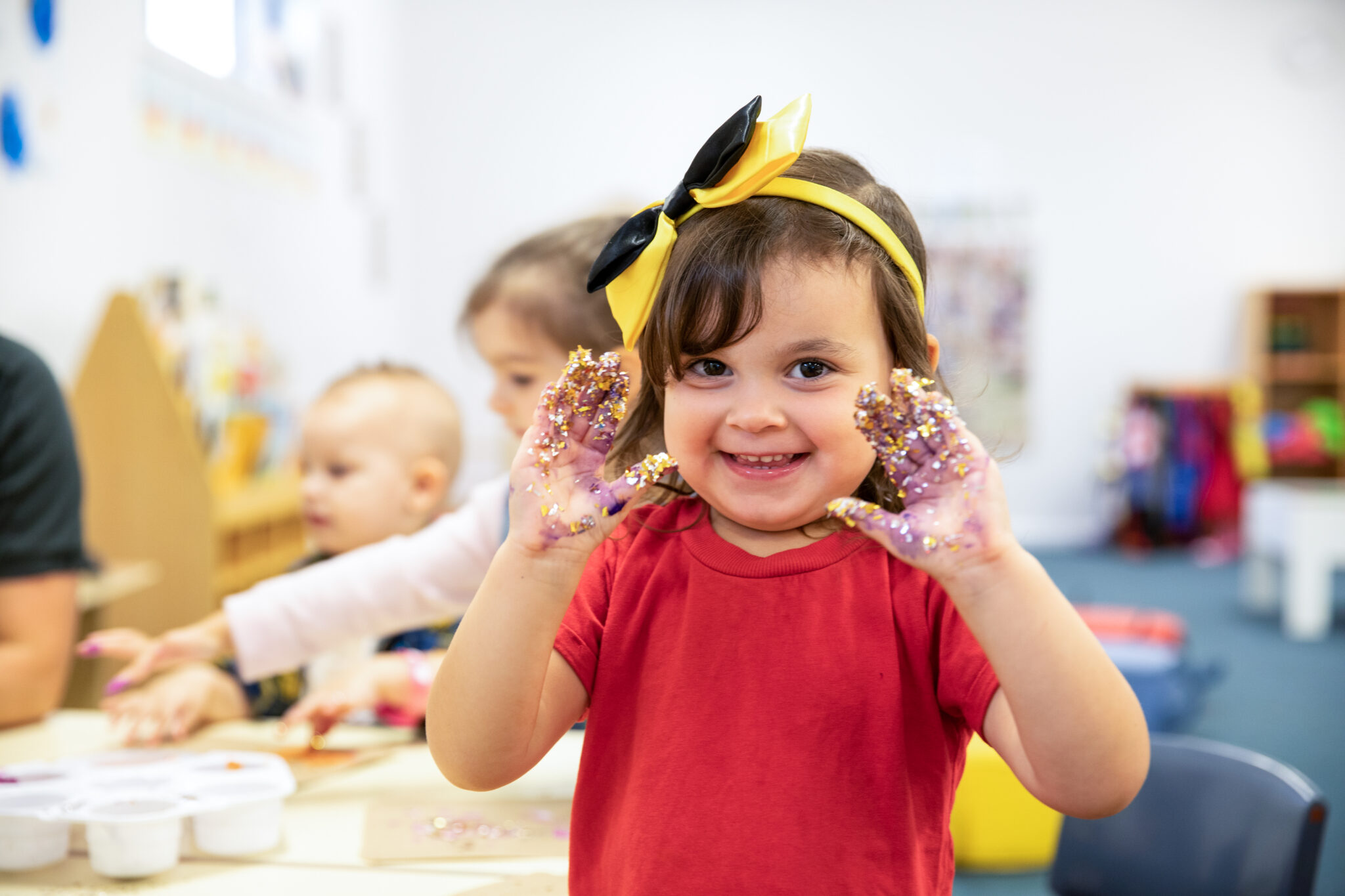
Post updated July 2025.
If you’ve ever watched your child squish playdough, swirl their fingers through water, or laugh while stomping in the mud, you’ve seen sensory play in action. These messy, squishy, delightful experiences aren’t just fun. They’re how young children make sense of the world.
From birth to five, sensory play is a powerful part of development. It helps build essential skills, regulate emotions, and support learning in ways that feel natural and joyful. At Aussie Kindies, we embed sensory play into our daily routines because we know how important it is to a child’s growth.
What is Sensory Play?
Sensory play is any activity that stimulates your child’s senses—touch, sight, sound, smell, and even taste (especially for babies and toddlers who love to explore with their mouths). It’s how children explore, discover, and learn in the early years.
You might hear it called messy play, creative play, or exploratory play. No matter what you call it, the goal is the same: to give your child rich experiences that support their physical, emotional, and cognitive development.
Sensory play is a key part of our Lifelong Learning Curriculum and aligns with the Early Years Learning Framework and ACECQA Quality Areas 1 and 3 - focusing on educational experiences that support each child’s whole development.
Sensory Play for Babies (0–1 year)
In the first year of life, sensory play helps babies develop crucial skills like hand-eye coordination, fine motor control, spatial awareness, and early communication. Even something as simple as exploring a soft blanket, a rattling toy, or cool water can spark learning.
At Aussie Kindies, our nursery educators plan sensory experiences based on each baby’s stage of development, whether they’re lying on their tummy, sitting supported, or beginning to stand.
“We integrate sensory play into all sorts of daily experiences in the nursery, from water play and goop to ice painting and scented playdough,” explains one of our Nursery Room Lead Educators. “It’s a central part of our Healthy Beginnings program. The babies absolutely love it, and it helps them explore and engage their senses as they grow.”
Sensory play also supports early language development, as babies begin to associate sounds with objects and learn to communicate what they’re experiencing.
Sensory Play for Toddlers (1–3 years)
Once your child is up and moving, sensory play becomes even more dynamic, and often a little messier (in the best way!). Toddlers are natural explorers, and sensory experiences support every area of their development, from language and movement to focus and self-regulation.
At this age, toddlers are learning through doing. They want to squeeze, squish, stack, pour, tip, shake, and repeat. That’s all part of the process. Through sensory play, they begin to make connections between what they see, feel, and hear, and start to understand how things work.
“Sensory play gives toddlers the freedom to explore and express themselves,” says one of our Toddler Room educators at Aussie Kindies. “They’re building early science and problem-solving skills just by playing with things like water, sand, jelly, or rice.”
Just remember: toddlers often explore with their mouths, so always supervise closely and choose safe, taste-safe materials.
Sensory Play for Preschoolers (3–5 years)
For children in the preschool and kindergarten years, sensory play continues to provide enormous benefits, just in new and more complex ways. It helps refine motor skills, build memory, strengthen problem-solving, and deepen social interaction.
Whether it’s working with clay, sorting coloured beads, or playing with musical instruments, children are building their ability to focus, follow instructions, and collaborate with others.
“Sensory development is so important from an early age,” says Jasmine, a Preschool Teacher. “When children explore with different textures, colours and sounds, it helps them make sense of their surroundings and boosts brain development. It’s a fun, safe way to learn and retain new information, especially in our School Readiness Program.”
And because sensory play is open-ended, it gives children the freedom to express themselves and follow their curiosity.
Sensory Play at Home: Easy Ideas to Try
You don’t need fancy equipment to support sensory play at home. Many of the best activities can be set up with things you already have in the kitchen or backyard. Here are a few to try with your baby, toddler, or preschooler:
1. Sensory Bottles
Fill a clean plastic bottle with water, glitter, beads, or coloured oil. Make sure the lid is tightly secured (you can tape or glue it shut) and let your child shake, spin, and explore the movement.
2. Nature Sensory Tray
Collect leaves, flowers, bark, shells or pebbles from outside. Lay them out in a tray or on a mat and let your child feel, smell, and describe what they discover.
3. Sensory Painting
Use feathers, sponges, corks or cotton balls as painting tools. Let your child dip them in paint and explore how each one leaves a different texture or pattern.
4. Scented Playdough
Homemade playdough is a classic sensory activity for a reason - it’s soft, stretchy, and perfect for creative play. Add lavender, peppermint or vanilla for a scent boost.

Important: For children under 5, always supervise closely during sensory play. Choose age-appropriate materials, avoid choking hazards, and ensure all items are non-toxic and safe to explore.
Why It Matters
Sensory play isn’t just about keeping kids busy, it’s about building brains, bodies and confidence. It helps babies feel secure, toddlers understand their environment, and preschoolers prepare for school and social life.
At Aussie Kindies, we believe play is learning. Through sensory experiences, children become curious learners, compassionate friends, and confident explorers, ready for whatever comes next.
Ready to see it in action? Find your nearest Aussie Kindies centre and book a tour today.